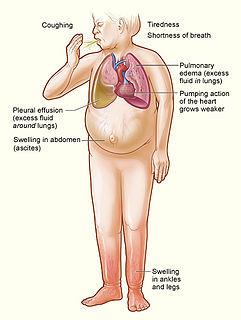
Uruguay, officially the Oriental Republic of Uruguay, is a country in the southeastern region of South America. It borders Argentina to its west and Brazil to its north and east, with the Río de la Plata to the south and the Atlantic Ocean to the southeast. Uruguay is home to an estimated 3.44 million people, of whom 1.8 million live in the metropolitan area of its capital and largest city, Montevideo. With an area of approximately 176,000 square kilometres (68,000 sq mi), Uruguay is geographically the second-smallest nation in South America, after Suriname.
This article is about the demographic features of the population of Uruguay, including population density, ethnicity, education level, health of the populace, economic status, religious affiliations and other aspects of the population.

This article deals with the diplomatic affairs, foreign policy and international relations of Uruguay. At the political level, these matters are officially handled by the Ministry of Foreign Relations, also known as Cancillería, which answers to the President. The Minister of Foreign Relations, since March 2015, is Chancellor Rodolfo Nin Novoa.

Carlos Gardel was a French Argentine singer, songwriter, composer and actor, and the most prominent figure in the history of tango. Gardel's baritone voice and the dramatic phrasing of his lyrics made miniature masterpieces of his hundreds of three-minute tango recordings. Together with lyricist and long-time collaborator Alfredo Le Pera, Gardel wrote several classic tangos.
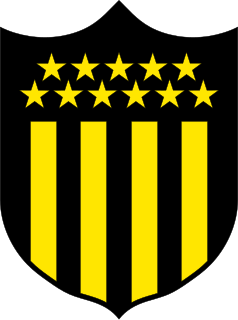
Club Atlético Peñarol —also known as Carboneros, Aurinegros and (familiarly) Manyas— is a Uruguayan sports club from Montevideo. The name "Peñarol" comes from the Peñarol neighbourhood on the outskirts of Montevideo. Throughout its history the club has also participated in other sports, such as basketball and cycling. Its focus has always been on football, a sport in which the club excels, having never been relegated from the top division.

Jorge Luis Batlle Ibáñez was a Uruguayan politician and lawyer, and a member of the Colorado Party. He served as the President of Uruguay from 2000 to 2005.

Juan María Bordaberry Arocena was a Uruguayan civilian dictator, politician and cattle rancher, who first served as a constitutional President from 1972 until 1973, and then ruled as the head of a civilian-military dictatorship up to 1976.

Jorge Abner Drexler Prada is a Uruguayan musician, actor and doctor specializing in otolaryngology.

Jorge Orosmán da Silva Echeverrito is a Uruguayan former footballer who played as a striker, and is the manager of Defensor Sporting.

Roberto Jorge Canessa Urta, M.D., is one of the 16 survivors of the Uruguayan Air Force Flight 571, which crashed in the Andes mountains on 13 October 1972, and a Uruguayan political figure. He was portrayed by Josh Hamilton in the 1993 feature film, Alive.
Korean Uruguayans, numbering 130 individuals, formed the 19th-largest Korean community in Latin America as of 2005, according to the statistics of South Korea's Ministry of Foreign Affairs and Trade.
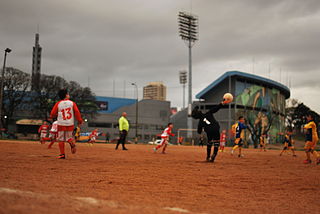
Football is the most popular sport in Uruguay. The Uruguay national football team has won two FIFA World Cup titles in addition to a record 15 Copa América titles, making them one of the most successful teams in South America. The national team won the first edition of the tournament in 1930, and won it again in 1950.
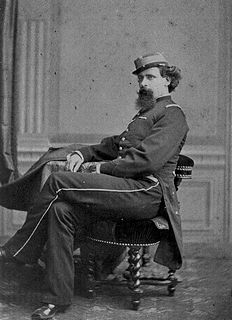
Lorenzo Latorre, full name Lorenzo Antonio Inocencio Latorre Jampen, was Uruguayan officer and politician, who was a dictator and President of Uruguay from March 10, 1876 until March 15, 1880. During his rule political opponents were oppressed, but at the same time, his reforms greatly improved the economy and state institutions.
Uruguayans or Uruguayan people, are people identified with the country of Uruguay, through citizenship or descent. Uruguay is home to people of different ethnic origins. As a result, many Uruguayans do not equate their nationality with ethnicity, but with citizenship and their allegiance to Uruguay. Colloquially, primarily among other Spanish-speaking Latin American nations, Uruguayans are also referred to as "orientals".
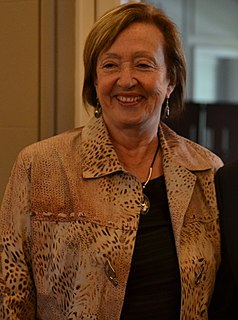
María Julia Muñoz is a Uruguayan doctor in medicine and politician. Formerly a Uruguayan Minister for Public Health, she is now a Minister of Education and Culture for Uruguay, as of March 1, 2015.

Daniel Fernando Sturla Berhouet, SDB is a Uruguayan Roman Catholic prelate and the archbishop of Montevideo.
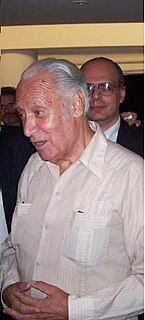
Alberto René Methol Ferré was a Uruguayan thinker, writer, journalist, teacher, historian and theologian. He has been described as one of Latin America's most fertile and original thinkers.
Susana Pintos Lepra was one of the thirteen student martyrs who were killed in Uruguay between 1968 and 1985. She was a student at the School of Construction of the Universidad del Trabajo del Uruguay and a militant of the Uruguay Federation of University Students (FEUU), the ANCAP Federation (FANCAP), and the Union of Communist Youth (UJC). Her death occurred on 21 September 1968, after she was shot by police during the suppression of a student demonstration.


